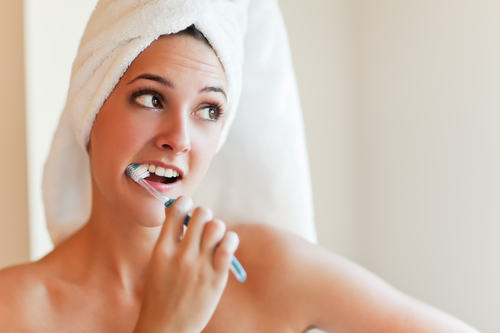
This question is deceptively simple. You should brush your teeth in the morning and at night, right? Technically, yes – but exactly what time in the morning and at night? Do you brush before or after breakfast? Before or after you floss? Before or after you use a mouthwash?
We have answers to all those questions. And while there might be universal suggestions for oral hygiene, it’s also important to do what works best for you. Take these as suggestions for what will be most effective – and check in with Dr. Barton as to what he recommends for your personal needs at your next exam.
How Many Times Should I Brush Each Day?
Dental professionals recommend brushing at least twice a day, and flossing once a day. This is typically adequate to prevent plaque buildup which can lead to gingivitis and tooth decay.
That said, if you can only stand to brush once a day, the best time to do so it between the last meal you eat and when you go to bed. After you brush, you should not eat or drink anything except for non-carbonated and unflavored water.
The mouth is an especially dangerous environment while you sleep. This is because the glands that produce saliva take a rest right alongside you. So, whatever is present on your teeth when you fall asleep stays in place throughout the night. This means that it’s easy for acids to erode the teeth if there are food particles and bacteria left behind.
So: getting your teeth as sparkling clean as possible before you go to sleep should be your top priority. This is why flossing at night is also a good idea, especially if you wear a night guard (which further traps bacteria against teeth and gums).
When Should I Brush in the Morning?
You should brush your teeth in the morning before you eat breakfast. Here’s why:
- Saliva levels are low – Because you’ve just woken up and your salivary glands have been dormant overnight, your teeth are at a higher risk. Bacteria and dietary acids are more easily able to attack your teeth. When you brush, you stimulate fresh saliva production, and also expose your teeth to fluoride to help protect against acids.
- You clear out leftover bacteria – Bacteria begin metabolizing sugars into acids near-instantly when exposed to food. Brushing away bacteria leftover from the night before helps you reset. This way, the bacteria aren’t in place to produce new acids when you eat breakfast. Plus, bacteria multiply overnight without much saliva present, so there could be an entire colony to get rid of.
- Acidic breakfasts soften enamel – If you have orange juice, citrus or sugary cereal at breakfast time, these will soften your enamel. Soft enamel is vulnerable to erosion from toothbrush bristles. So, brushing after you eat can actually compromise your enamel and cause damage.
When Should I Brush at Night?
Like we mentioned earlier, you should brush after you eat your last food of the day but before you go to sleep. Since you can soften your enamel with acidic foods and drinks (like we mentioned in the breakfast section), it’s a good idea to leave at least 30 minutes between dinnertime and oral hygiene.
We know that it can feel good to brush immediately after eating – and aren’t you following your dentist’s advice to brush after meals? The thing is, we should really say “brush 30-40 minutes after meals” because immediate brushing just isn’t the safest thing to do. While immediate brushing will remove food particles and leave your mouth feeling clean, it will also abrade your enamel if it’s been softened by your meal. And as many foods and drinks are acidic, it’s likely that your oral pH has been compromised.
Instead of brushing right away, try rinsing your mouth with water right after eating. This accomplishes some of the same positive benefits as brushing, but doesn’t damage your enamel.
What Order Should I Brush & Floss In?
Some studies have suggested that it can actually be beneficial to floss before you brush, especially if you’re using fluoride toothpaste. This is because flossing removes food particles from the spaces between teeth, opening them up to room for the fluoride. This allows it to impact the areas between teeth, which are often prone to tooth decay.
Quick Takeaway:
- Brush in the morning before breakfast
- Brush at night 30-40 minutes after dinner
- Floss at night before brushing
Have questions about your own oral hygiene? Reach out to our staff for help.
Dalton General Dentist | General Dentistry Dalton | General Dentist Dalton





